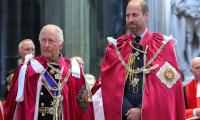The people’s historian
Writing about the problems of historiography in Pakistan, Dr Mubarak Ali has pointed out that we are obsessed with the role of personalities, the Two-Nation theory, and religious feelings. He recommends that now we change this framework and write history with new contours.
He suggests that for good historiography and credible understanding of history we must get out of personality cults and break or at lease loosen the straitjacket of fixed ideologies and keep our religious sentiments away from history. He advocates a new interpretation of the partition of India that is in line with the changing ideas of new generations and their expectations. We need to look at the past with a new angle now. In his essay titled ‘Aap beeti aur history’ (Biography and history) Dr Mubarak Ali raises a question about why some people write autobiographies.
“To project their own personalities as historical figures they make attempts to uncover such aspects that don’t get attention in mainstream history. Some people also write autobiographies to either narrate their own versions of events, or to mutilate them with their own likes and dislikes. Sometimes they present a cursory narration so that not the whole truth comes out. Individually people also write autobiographies so that their errors of judgment, or their complicity in conspiracies and shenanigans, treachery, and corruption can be whitewashed to prove their own selves as innocent and sinless.”
That’s how Dr Mubarak Ali teaches us how to assess autobiographies in Pakistan, especially written by civil and military bureaucrats who have presented a certain kind of history that we need to judge and evaluate with stringent measure. Similarly, in his essay titled ‘Historiography in Urdu’ he highlights three feature in good historiography: First is the context in which events take place with their detailed background and foreground, second is the evidence or proof to verify those events and situations, and the third is the historian’s own critical analysis and explanation.
“To write history now it is imperative to use a theoretical framework. History and theory have become interconnected. Such frameworks may include communalism, nationalism, Marxism, post-modernism, structuralism, and many others that have influenced historiography and a historian must try to explain and interpret historical events with their help.”(Page 91)
Here by theory we mean an analytical perspective or viewpoint that serves as our lens to look at history. A historian may use more than one framework to avoid mutilating history by imposing one ideology. If any one official version of history is propagated – as happens in most authoritarian societies – the social fabric starts fraying with devastating results for society itself, be it an authoritarian persecution or the imposition of uniformity in the garb of democracy. Dr Mubarak Ali applied these points to his own PhD thesis on the Mughal court, which was written in the 1970s but is still important and useful.
While a majority of Pakistani historians have narrated Mughal history with a chain of events, Dr Mubarak Ali focused more on the Mughal civilization, culture, norms, festivals, and etiquettes. His thesis, which has seen multiple editions in Urdu, not only tells us about the pomp and glory of the Mughal court but also takes us behind the curtain of wealth to people’s poverty and the mentality of a feudal dispensation. Another insightful book by Dr Mubarak Ali is ‘Ulema aur Siyasat’ (Religious scholars and history) in which he has discussed in detail the role such scholars have played in Muslim societies.
He explains that in Muslim society the clout of religious leaders intensified when the number of non-Muslims increased whose mother tongue was not Arabic and they faced difficulties in grasping the Quran and its exegesis, Islamic traditions and other religious teachings. There emerged a need for such people who knew the Arabic language and could impart religious education. So the scholars served as a link between people and religion. The seminaries these scholars established had differences in thought that resulted in the formation of denominations and sects. Contrary to Sunni Islam, in Egypt the Fatimids established al-Azhar that trained scholars in their own school of thought.
To counter that, the famous minister in the Seljuk dynasty, Nizam al-Mulk Tusi (1018 – 1092), started a chain of seminaries that became known as Nizamiya. And then there were countless seminaries of Hanafi, Shafii, and other schools of thought that went in opposition to Shia, Ismaili, and Qaramati movements. In the same book ‘Ulema aur Siyasat’ (Scholars and politics), Dr Mubarak Ali discusses al-Mawardi’s (972 – 1058) ‘Al-Ahkam al-Sultania’ (The ordinances of government), al-Ghazali’s (1058 – 1111) ‘Nasihat al-muluk’ (Counselling kings), Nizam al-Mulk’s ‘Siyasatnama’ (The book of government) and Keikavus’ (1050 – 1087) ‘Qabus Nama ‘(Mirror of princes).
With these, Dr Mubarak Ali explains how scholars of varying strands were interpreting the intricacies of government and politics differently. Al-Mawardi and al-Ghazali suggested that religion be superimposed on all matters of government and politics. Whereas Nizam al-Mulk and Keikavus promoted the older Persian theory of kingship which was secular to an extent and stressed on fairness and justice more than on any one religion.
In ‘Ulema aur Siyasat’, we also read discussions on fundamentalist and reformist movements with a critique of Imam ibn-Hunbal (780 – 855) and Imam ibn-Taymiah (1263 – 1328). There is also a chapter on the role for religious scholars during the Ottoman and the Safavid dynasties. The last part of the book deals with the Subcontinent and the political role such scholars played from the Delhi Sultanate and the Mughal period to the British era. Another noteworthy book by Dr Mubarak Ali is ‘Tareekh ke Naye Zaviye’ (New angles in history) in which he writes about the power and utility of history and the changing concepts of history’s reconstruction.
Discussing the utility of history, he sheds light on historians from ibn-Khaldun (1332 – 1406) to Spengler (1880 – 1936) and Toynbee (1889 – 1975). Writing in his essay ‘The power of history’, he informs us that when Aurangzeb toppled his father and after ten years decreed that no court historian would write any history, 18th century onwards there was no court history but there was more discussion on people’s economic, political, and social problems. He laments that after the inception of Pakistan once again a court-like historiography began. For example, General Ayub Khan’s military coup was termed a ‘revolution’.
That is one reason historiography in Pakistan did not get a free hand and there was no truly autonomous research institutions. Most of the historians are either in government employment or work in educational institutions where a sword of government scrutiny is always overhead. Another distinguishing feature of Dr Mubarak Ali is that he advises against personality cults even if it involves raising questions about persons such as Iqbal and Jinnah. In one of his essays ‘The personality of Quaid-e-Azam’ he writes:
“Mr Jinnah preferred limited and selected company, didn’t speak much, and never allowed anyone to interfere in his personal matters. Even in his personal relations he was not easily approachable and didn’t come close to anyone, never sharing his secrets or sorrows with people around him. All that created a certain aura around him and his personality appeared as magnificent and majestic.”
Dr Mubarak Ali continues: “Due to this characteristic of Mr Jinnah’s personality some people thought that in nearly every matter his opinion was final and the Muslim League and its leaders were just like a rubberstamp that endorsed his most decisions without argument or reasoning. That’s why Mr Jinnah was dubbed the sole spokesman of the Muslims and the Muslim League.
To be continued
The writer holds a PhD from the University of Birmingham, UK and works in Islamabad.
Email: mnazir1964@yahoo.co.uk
-
 Jelly Roll Finally Shares Painful 'secret' Following 2026 Grammy Win: 'Wanted To Scream'
Jelly Roll Finally Shares Painful 'secret' Following 2026 Grammy Win: 'Wanted To Scream' -
 Noah Wyle Gives Exciting Update About 'The Pitt' Season 3
Noah Wyle Gives Exciting Update About 'The Pitt' Season 3 -
 Who Is Behind Princess Eugenie, Beatrice's Ban From Royal Ascot Amid Sarah, Andrew Scandal?
Who Is Behind Princess Eugenie, Beatrice's Ban From Royal Ascot Amid Sarah, Andrew Scandal? -
 Kate Middleton Sunbathing Photos: New Book Sheds Light On Prince William's Reaction
Kate Middleton Sunbathing Photos: New Book Sheds Light On Prince William's Reaction -
 Jim Curtis Shares Rare Details How His Relationship With Jennifer Aniston Started
Jim Curtis Shares Rare Details How His Relationship With Jennifer Aniston Started -
 Who Organized 'The Office' Reunion At Actors Awards 2026? Revealed
Who Organized 'The Office' Reunion At Actors Awards 2026? Revealed -
 King Charles Set To Abdicate Next Year, 'official Reason' Revealed
King Charles Set To Abdicate Next Year, 'official Reason' Revealed -
 Paris Hilton's Power Move To Make 'neurodiversity Relatable'
Paris Hilton's Power Move To Make 'neurodiversity Relatable' -
 Michelle Williams Remembers 'friend' James Van Der Beek After His Death
Michelle Williams Remembers 'friend' James Van Der Beek After His Death -
 Woody Harrelson Unveils The Favour ‘living Legend’ Harrison Ford Asked For Before Actor Awards
Woody Harrelson Unveils The Favour ‘living Legend’ Harrison Ford Asked For Before Actor Awards -
 How Long Have Zendaya And Tom Holland Been Dating?
How Long Have Zendaya And Tom Holland Been Dating? -
 Real Reason Why 'Only Murders In The Building' Cast Didn't Attend 2026 Actor Awards
Real Reason Why 'Only Murders In The Building' Cast Didn't Attend 2026 Actor Awards -
 Prince William Makes Big Decision After Princess Eugenie, Beatrice Ban
Prince William Makes Big Decision After Princess Eugenie, Beatrice Ban -
 GLP-1 Drugs Linked To Osteoporosis And Gout: New Study Reveals Higher Risks
GLP-1 Drugs Linked To Osteoporosis And Gout: New Study Reveals Higher Risks -
 Seth Rogen Unveils Catherine O’Hara's Distinguished Quality In Emotional Tribute
Seth Rogen Unveils Catherine O’Hara's Distinguished Quality In Emotional Tribute -
 MWC 2026: New Smartphones, AI Gadgets And Tech Innovations Revealed
MWC 2026: New Smartphones, AI Gadgets And Tech Innovations Revealed



